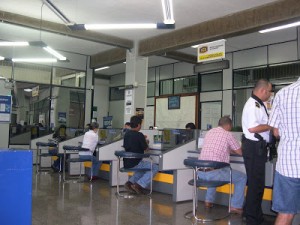Costa Rica News – How many people living in Costa Rica have had to deal with the absolute frustrations of dealing with the customer service of the government run utility companies in Costa Rica? Anyone who decides to rent or buy a property will eventually have to deal with a Tico utility company. Today, there is some degree privatization, you have few options to choose from:
- AYA – The water company
- CNFL – the electric company
- ICE – the telephone company
- TIGO (formerly Amnet) – a cable company
- Cable Tica – another cable company
- RACSA – an internet company
However, the reality is that the telephone, electric (CNFL), and internet (RACSA) are all technically owned by the same government agency, ICE. ICE is a legacy monopoly of Costa Rica, which is one of the oldest organizations in Costa Rica. Because they have never had competition, they have many luxuries, which do not survive in a free-market, which includes price fixing, inferior products and services. This all adds up to an administrative foundation that provides poor customer service and technical support.
government agency, ICE. ICE is a legacy monopoly of Costa Rica, which is one of the oldest organizations in Costa Rica. Because they have never had competition, they have many luxuries, which do not survive in a free-market, which includes price fixing, inferior products and services. This all adds up to an administrative foundation that provides poor customer service and technical support.
AYA and ICE have been around for nearly a century without outside market influences that normally correct poor business practices, poor ethics, disregard for the environment and terrible customer service. The hydraulic damns, constructed by both companies to generate revenues, do nothing but destroy the ecosystems that once existed. The residual water and raw sewage is almost never treated before being introduced to the environment. Many of the beaches are well-known to contain unsafe levels of bacteria due to the amount of sewage being dumped into the waterways on a daily basis. Because it is a government-owned agency, it is an uphill battle to get any of these problems fixed, because changes get trapped in a corrupt political process.
Thankfully, there is a global trend towards privatization that has begun to take roots in Costa Rica. Privatization in the US began with the break-up of the Big Bells back in the 80’s. Next, the telecoms and cable companies were deregulated in the 90’s. During this period, the bureaucratic executives at ICE probably never believed that privatization could come to Costa Rica. The ICE telephone network has historically been very locked-down, allowing very few competitors to enter as a roaming service. The long distance charges that ICE placed on international calls have always been historically astronomical. Privatization has sprung roots in Costa Rica and changes have occurred, which the executives at ICE totally failed to predict.
The Giant ICE Sleeps While Major Business Switch to VOIP
How many companies that need to compete in the global market place are going to pay over $2 per minute on international calls? The easy answer is none. In the last decade, Costa Rica has exploded in growth in Call Centers, Customer Support and Shared Services. Even though ICE owns the entire internet in Costa Rica , it totally failed to turn this into an opportunity. It’s clumsy internet subsidiary called RACSA, allowed new businesses to use VOIP as a basis to run call centers, right it’s own nose.
Did ICE respond to this competitive threat with innovation? No. The executives there hoped and prayed nothing was changing, until it became obvious that there were losing on a huge amount of revenue. Then instead of coming out with a competitive product or service, they complained to government and tried to make VOIP illegal in Costa Rica through the court system.
The Costa Rica economy is dependent on these new businesses, such as Intel and Hewlett Packard, which create thousands of jobs for Ticos and has transformed the entire economy from a Banana Republic, to an exporter of support services, medical devices and computer chips. These very executives are beating their fists, at their own ignorance, and wishing that Costa Rica would go back to exporting traditional items like coffee and bananas.
What do you think is better for the Costa Rican economy? Monopolistic utilities, which pollute the land and stifle innovation, or new economy businesses such as Amazon and Hospira, which aim to reduce their environmental footprint, while creating innovative products and services which can take Costa Rica to the next level.
What’s in future for AYA, ICE, CNFL, TIGO and RACSA? For the corrupt bureaucrats and spoiled/lazy employees, you probably should continue to “hunker down” and pray that you don’t lose your job. The tide of privatization and innovation is working against you. The new companies in Costa Rica, will not put-up with poor products and services. History already shows they will just innovate and find a way around your unchangeable approach to running a business. Sleeping on the job, exercising horrible customer service, making bad decisions, and just dropping the ball, when it is passed to you, do not play well in the new economy.
Persistent Mediocrity in Public Utilities
 In a figurative sense, you don’t need to visit the rainforest in Costa to see sloths, snakes and monkeys. Just drive around and try to spot an AYA work crew. After all, if you problems at the top of the business, experience shows this this trickles down to your front-line employees. Hence it is normal to see work crews smoking and relaxing, while one person, who is low on the totem-pole does all the work. Take this as an example of the company as a whole. The big guys at top all sit around and smoke and laugh while the powerless front-line staff focus on mediocracy. This is not much different than the ant nests you might see in the rainforest. The queen ant sits and gets fat, while the workers all exhaust themselves non-sensibly around her.
In a figurative sense, you don’t need to visit the rainforest in Costa to see sloths, snakes and monkeys. Just drive around and try to spot an AYA work crew. After all, if you problems at the top of the business, experience shows this this trickles down to your front-line employees. Hence it is normal to see work crews smoking and relaxing, while one person, who is low on the totem-pole does all the work. Take this as an example of the company as a whole. The big guys at top all sit around and smoke and laugh while the powerless front-line staff focus on mediocracy. This is not much different than the ant nests you might see in the rainforest. The queen ant sits and gets fat, while the workers all exhaust themselves non-sensibly around her.
Walk into any ICE, AYA, RACSA or TIGO office and you might spot a two-toed sloth. That’s right! You will see a very lazy customer service representative, handling your case with the speed of that same creature. Even though they have ten fingers, they struggle to type-out your case with two fingers. If your name is not Spanish, or you cannot speak perfect Spanish, they will huff and haw, and hand your case over to the one single representative capable of speaking Basic English.
As is the case with most government and utility services in Costa Rica, you can expect to take your problem to take a full day or multiple trips to sort itself out. Plan to take a ticket and wait in line. Bring a book to read and full expect that ICE, AYA, RACSA or TIGO will care less about your job, your family or the value of your business as a source of revenue.
As Costa Rica grows from a banana republic, and privatization takes root, both Ticos and foreign residents are hoping for a major shake-up in the public utility providers in Costa Rica. We are all united in the hope that the days are numbered for laziness and mediocrity at companies like AYA and ICE.
Sent to Us by One of our Readers

